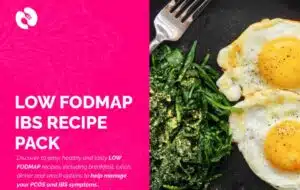Over the past 10 years of working with women with PCOS, I have worked with so many women who have both PCOS and IBS and need help managing both syndromes. It also led me to ask the question, “Is there a link between PCOS and IBS?”
Research shows that women with PCOS are more likely to suffer from irritable bowel syndrome. Although the exact cause of IBS in women with PCOS is unclear, it has been linked with chronic inflammation, gut dysbiosis, and elevated luteinizing hormone, and follicle-stimulating hormone.
Thankfully, there are some things that can be done to improve both the symptoms of PCOS and IBS. But before we get on to that, we need to understand the symptoms of IBS.
What is Irritable Bowel Syndrome?
Irritable bowel syndrome (IBS) is a common disorder that affects the large intestine, or colon. The main symptom is abdominal pain or discomfort in association with altered bowel function. It is also often referred to as spastic colon.
According to Healthline, the most common symptoms of IBS include:
- Pain and Cramping
- Diarrhea
- Constipation
- Alternating Constipation and Diarrhea
- Changes in Bowel Movements
- Gas and Bloating
- Food Intolerance
- Fatigue and Difficulty Sleeping
IBS Subtypes
Just as there are different types of PCOS, there are also different subtypes of IBS, namely (1):
- IBS-C – IBS with constipation
- IBS-D – IBS with diarrhea
- IBS-M – mixed type
- IBS-U – unsubtyped
IBS vs IBD
Irritable bowel syndrome and irritable bowel disease are two totally different things and are treated very differently. IBD is an inflammation of the bowel wall as opposed to irritation of the gut tract that is seen in IBS.
If you are struggling with IBS or possible IBD, it is really important to get a formal diagnosis so that you know exactly what you are dealing with and can treat it appropriately. A gastroenterologist would be the best doctor to consult.
Okay, so how are PCOS and IBS linked? I’m so glad you asked!
The Link Between PCOS and IBS
So, we have established that PCOS and IBS are often linked. In fact, one study found that the prevalence of IBS in the general population is around 11% whilst it is about 20% in women with PCOS (2) and in Dr Felice Gersh’s book, PCOS SOS, she suggests that about 40% of women with PCOS also have IBS.
Also, IBS-C (constipation) seems to be the most common subtype of IBS found in women with PCOS, thanks to our elevated LH/FSH levels.
So, if you have PCOS and IBS, what can you actually do about it?
Tips for Managing PCOS and IBS
Take Probiotics for PCOS and IBS
Women with PCOS tend to have less diverse gut bacteria and this can have a knock on effect in so many ways. One study suggests that irregularities in the gut microbiome can impact on PCOS in the following ways (3):
- Increase androgen levels
- Increase energy absorbed from food, contributing to weight gain in women with PCOS.
- Contribute to insulin resistance
- Impacts on cholesterol levels and contributes to heart disease
- Changes bile acids which contributes to chronic inflammation
- Increases intestinal permeability which causes an auto-immnune response
When you look at that list, you realize just how important our gut health actually is!
Probiotics can be a really helpful way to manage some of the symptoms associated with IBS whilst also improving gut health to manage some of your PCOS symptoms.
Go for a probiotic that is specifically targeted at IBS. Bio-Kult Digestive System is a good option and has 14 live culture strains to support your gut health.
Exercise Improves PCOS and IBS Symptoms
We know that exercise is crucial for women with PCOS. It helps to improve:
- insulin sensitivity
- frequency of ovulation
- cholesterol
- body composition
But, the great news is that exercise can also help to alleviate the symptoms of IBS.
A recent study found that exercise helped to alleviate the symptoms of IBS and had the added benefit of also improving mood and anxiety (something that so many women with PCOS also struggle with).
Although researchers aren’t clear on exactly how exercise helps with IBS symptoms, Healthline suggests that exercise helps with:
- Improving well being
- Managing stress levels
- Encouraging bowel movements
- Improves sleep quality
- Helps to clear gas
So, now I know that you are going to ask WHAT type of exercise you should do. We know that resistance training and HIIT can be helpful for women with PCOS but we the same Healthline article suggests that these exercises can make IBS symptoms worse.
Where does that leave us?
Walking and yoga have been shown to be helpful for IBS. The good news is that both of these forms of exercise are also helpful for women with PCOS.
One study found that doing a one hour yoga class 3 times a week helped to lower testosterone levels by 29%! (4)
Also, walking has been shown to lower waist-to-hip ratio and improve cardiovascular disease in women with PCOS (5).
So, if walking and yoga is all you do, it is enough. It can help with both PCOS and IBS and can help you to manage both syndromes.
A low FODMAP diet helps with PCOS and IBS
There is good news on this front too. A low FODMAP diet can help you to manage your IBS symptoms (6) and can also be used to manage PCOS.
According to Medicine.net FODMAPS are short-chain carbohydrates and sugar alcohols that are poorly digested by the body. As they are not well-digested, they are left to ferment in the intestine, leading to a lot of the symptoms of IBS.
Some of the foods that are considered high FODMAP foods include:
- Stone fruit
- Beans and lentils
- Wheat and rye
- Some vegetables
- Dairy products
- Nuts
A low FODMAP diet is very restrictive and difficult to stick to over the longer term. The idea here is to eliminate FODMAPS for a period of 3-6 weeks and see what your symptoms are like. If you see an improvement in your IBS symptoms during this time, you can slowly start reintroducing foods and monitor how you feel.
I know that this looks quite overwhelming but there are SO many amazing recipes that are low FODMAP and PCOS friendly.
I just recently created a PCOS and IBS low FODMAP recipe pack for the women in PCOS Foodies. You can check it out here:
Keeping a Food Journal Can Help Track your IBS Symptoms
A food diary is a record of foods that you eat on a meal-by-meal basis. It can help you better understand your eating habits and patterns. Keeping track of what you have eaten and how you feel after meals can help you identify problematic foods that may be triggering your IBS symptoms.
It can be as simple as making a note of what you have eaten, the time that you ate it and how you feel.
For PCOS Foodies members, a food journal has been uploaded to the Resources page inside of PCOS Foodies.
Summing it Up
It is not uncommon for women with PCOS to have IBS. What’s more, the two conditions are closely linked in terms of how they affect your body. One way you can manage both syndromes is by taking probiotics (to help regulate gut bacteria), exercising regularly (to lessen stress and improve hormone profiles) and following a low FODMAP diet to reduce bloating from food intolerance.
Have you found any methods that work well for managing these issues? Let me know in the comments below!
- sustainable pcos weight loss strategies
- Over 5500 women have done it and seen results
- [bonus] Done for you pcos meal plans
- [bonus] intermittent fasting for pcos course
- [BONUS] personalised nutrition plan
JOIN OVER 5,500 OTHERS
References
1 Self, M; Czyzewski, D; Chumpitazi, B; et al. Subtypes of Irritable Bowel Syndrome in Children and Adolescents. CLINICAL GASTROENTEROLOGY AND HEPATOLOGY, 2014.
2 Bazarganipour, F; Taghavi, S; Asemi, Z; et al. The impact of irritable bowel syndrome on health-related quality of life in women with polycystic ovary syndrome. HEALTH AND QUALITY OF LIFE OUTCOMES, 2020.
3 Zhao, X; Jiang, Y; Xi, H; et al. Exploration of the Relationship Between Gut Microbiota and Polycystic Ovary Syndrome (PCOS): a Review. GEBURTSHILFE UND FRAUENHEILKUNDE, 2020.
4 Patel, V; Menezes, H; Menezes, C; et al. Regular Mindful Yoga Practice as a Method to Improve Androgen Levels in Women With Polycystic Ovary Syndrome: A Randomized, Controlled Trial. JOURNAL OF OSTEOPATHIC MEDICINE, 2020.
5 Khademi, A; Alleyassin, A; Aghahosseini, M; et al. The Effect of Exercise in PCOS Women Who Exercise Regularly. ASIAN JOURNAL OF SPORTS MEDICINE, 2010.
6 Nanayakkara, W; Skidmore, P; O’Brien, L; et al. Efficacy of the low FODMAP diet for treating irritable bowel syndrome: the evidence to date. CLINICAL AND EXPERIMENTAL GASTROENTEROLOGY, 2016.









